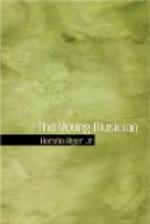“Suppose I have.”
“I wish you to bring it round to my house in the morning, and I’ll give you something for your trouble.”
“You must excuse me, Squire Pope. If it were your property, I would bring it to you and charge nothing for my trouble.”
“Young man,” said the squire sternly. “I am Philip’s legal guardian, and I have a right to receive his violin. You will get into trouble if you resist my authority.”
“If you will give me Philip’s order for it, you shall have it, sir.”
“Frank Dunbar, you are trifling with me. Philip is now a pauper, and has no right to hold property of any kind. He cannot give a legal order.”
“Then you are guardian to a pauper?”
“In my capacity of overseer of the poor.”
“In my capacity as Philip’s friend, I refuse to consider you his guardian. You may call him a pauper, but that doesn’t make him one.”
“He is an inmate of the Norton Poorhouse.”
Frank laughed.
“I don’t want to be disrespectful, Squire Pope,” he said; “but I can’t help telling you that you undertook a bigger job than you thought for, when you made up your mind to make a pauper of Philip Gray.”
Squire Pope was indignant at the coolness of Frank.
“I shall come to your house to-morrow morning,” he said, “and convince you to the contrary.”
“Very well, sir.”
Frank Dunbar bowed, and the squire went his way.
“That’s a very impudent boy!” he soliloquized. “Just like the Gray boy. It wouldn’t do him any harm to put him under Joe Tucker’s care, too.”
After the squire had passed on, Philip came out from behind the stone wall.
“Did you hear what passed between your guardian and myself?” asked Frank.
“Yes, I heard every word.”
“He little thought that the bird had flown, Phil.”
“He will make all the trouble he can. That is one more reason why I think it best to leave town.”
“I wouldn’t let Squire Pope drive you out of town.”
“I would stay and face the music if it suited me, but I want to go away.”
“Suppose we cut across this field. It will be a little nearer.”
“All right.”
There was a pathway through a pasture-lot, comprising some ten acres, poor land, covered with puny bushes, and a few gnarled trees, producing cider-apples. It belonged to an old bachelor farmer, who lived in solitary fashion, doing his own cooking, and in general taking care of himself. He was reputed to have money concealed about his premises, which was quite probable, as he spent little, and was known to have received, four years before, a considerable legacy from the estate of a brother who had died, a successful merchant in the city of New York.
The boys had to pass by the small and weather-stained house where he lived, as the path ran very near it.
When within a few rods of the house, the boys were startled by a sharp cry of terror, which appeared to proceed from inside the house.




